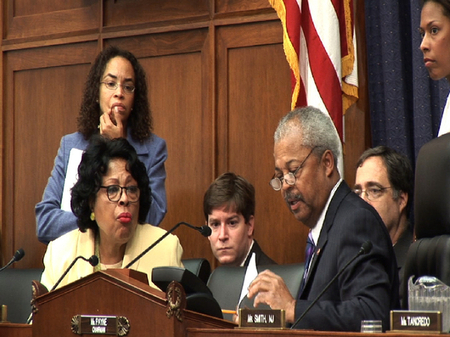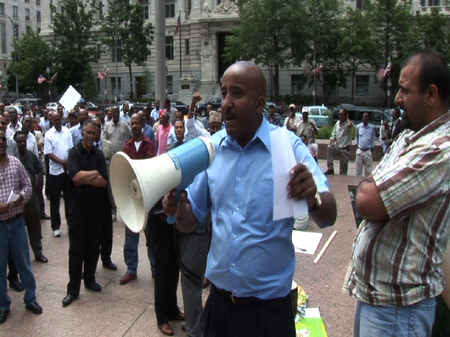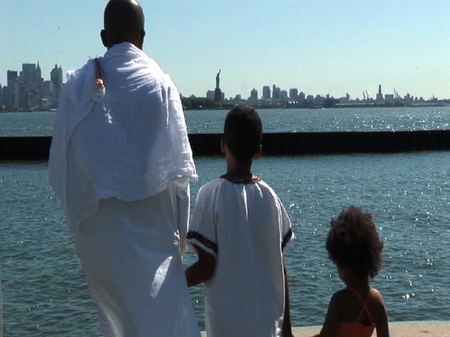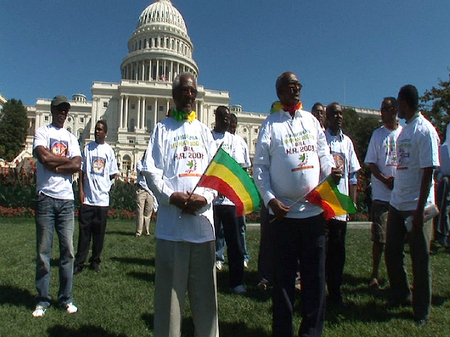Above: Chris Flaherty (Photo from Tadias archive)
By Tadias Staff
Published: Friday, May 23, 2008
New York (Tadias) – Here is our interview with Chris Flaherty, Producer and Director of Migration of Beauty, which was initially a documentary about the success of Ethiopians in America, but which later was transformed to a reflection on the Diaspora’s reaction to the controversial 2005 Ethiopian elections.
He speaks to us following our commentary about his film (Film Tackles Controversial 2005 Elections).
Tadias: Chris, thank you for agreeing to do this interview. Could you please tell us a bit about yourself and how you became interested in the Ethiopian American community?
Flaherty: Perhaps it’s best to ask someone like my wife to describe myself. I am married to an Ethiopian woman. We just had a baby a few weeks ago. Besides the absolute beauty of Ethiopian women it was the culture that lured me to Ethiopians. From the beginning I was intrigued with it. I was intrigued enough to take Amharic classes and learn a bit about Ethiopian culture and history. As with most things, when I approach something that appears to be absolutely foreign and off the beaten path I have a tendency to open my mind and absorb it as best I can regardless of how uncomfortable it makes me. From the beginning, it never bothered me to find myself sitting in a room with people speaking a language I didn’t understand. It only compelled me to learn the language. Every venture into Ethiopian culture was exciting and new. I truly enjoy it.
Tadias: Tell us about the film
Flaherty: When I first started making Migration of Beauty the concept was never 100% clear. I knew it was going to be something about the Ethiopian/American immigration experience but there was never a solid script. Making a documentary film for me is a learning experience. There is absolutely nothing in film school that could prepare you for this type of approach. Besides conveying a good story I also expect myself to be a different animal when a project is finished. It’s all about who and what I have become as a result of this experience. That is a reward bigger than money. I am not motivated by money. The film in a nutshell is about Ethiopian/Americans exercising certain virtues as U.S. citizens that aren’t possible in Ethiopia. I do this by telling the true story of two characters who came to the U.S. After being persecuted by the Derg regime in the 1970’s. In Ethiopia they became enemies of the state simply for speaking out. When they came to the U.S. everything changed for them. In time they realized their passion for political activism and that they could practice it it openly. Please understand that I’m not simply telling the old experience of two people. Extreme parallels are drawn between their experience and more current events. I attempted to connect certain ideas to the audience on more visual and human terms. It so happens I examined the Ethiopian national election of 2005 in dramatic fashion and attempt to capture a metamorphic moment in time when Ethiopian/Americans realized the power of their U.S. citizenship. I wanted the audience to understand that what Ethiopian/Americans did in response to the election could easily get them killed or imprisoned in Ethiopia as Ethiopians. The film is about standing up not being afraid and that it IS possible to affect foreign policy with peaceful political participation. I wholly believe that their story is an American experience story not just an Ethiopian story.
Tadias: How well does your film represent the diverse views and opinions found in the Ethiopian American community?
Flaherty: It’s a matter of perception as weather the views and opinions are “diverse” enough. Certainly, as far as the political issues themselves are concerned it is very diverse. There is no documentary film that I know of that attempts to present the opinions and views from as many sides on this subject. Both sides to this potentially flammable subject get their say. You should find the film interesting because it’s edited in such a way as to give the feeling of a debate. The important thing is that the discussion is very open and public in true democratic form. The idea that we should avoid the discussion because of controversy or ruffled feathers is a preposterous one. The more debate the better. It’s what democracy is all about. As far as the views of the Ethiopian/Americans seen in my film are concerned I did my best to invite and include their input. I think it’s best for you to attend the screening so you judge for yourself.
Tadias: How is it possible for a film that “explores” one of the biggest domestic Ethiopian political events in recent memory, “this potentially flammable subject” (to use your own words), and treat the actual diverse views and opinions of Ethiopian Americans as a “matter of perception”?
Flaherty: As I said before my approach to making a documentary is a bit more in the cinema-verite way of thinking. What truths that exist are not known until I embark on the journey. While I had an idea I intentionally avoided a rigid outline as not to compromise the experience. Truly, this is how I like to do it. There were some that really wanted something other than what turned out. It’s not implausible that I might consider making “that” film in the future. Certainly, a “feel good” movie about Ethiopian culture and entrepreneurial success is not a bad idea but it was difficult for me to deliver a solid story from this particular truth.
Tadias: Fair enough, a dialogue about the 2005 Ethiopian elections is just as important a topic, worthy of film as any other. It did after all, make headlines across the globe. You are telling a story here, Chris, just not the one you had originally told us. Here is how you had described the film’s intent in November 2006, in your own words:”Often the only things some people seem to know about Ethiopia are the issues of famine and war. Considering what the media reports you might have a rather bleak picture of things. In our documentary film, Migration of Beauty, we will attempt to reveal the side of Ethiopia most people never see.” You had shared with us that you had “invited some uniquely qualified people to talk about the rich culture Ethiopians bring to the U.S. as well as the beautiful land they come from. In the end, we believe you will agree it is truly a migration of beauty.” Did you not say this?
Flaherty: (No response)
Tadias: Okay, we let’s move on to the next question.
Tadias: Let’s look at the target market for this film. Chris, as you know, Ethiopian Americans are politically very diverse. We are Democrats, Republicans, Independents, and more. You can see the diversity in the current historic U.S. elections as well. There are those that are actively campaigning for Senator Obama (Ethiopians for Obama for example), and those that are volunteering for the campaigns of Senator Clinton and Senator McCain. We even have a young man running to be seated as a delegate in the democratic convention. Similarly, the views of Ethiopians when it comes to domestic politics is also very diverse. We are the first to admit that those that are involved in Ethiopian domestic politics, especially the older generation, tend to be very cautious about open dialogue and engagement across political lines. Of course, that is understandable given their past unpleasant experiences and the fact that they did not grow up in a democratic culture. They are highly opinionated (on all sides). That stands in stark contrasts, however, with the new generation, especially those that grew up in the states with the culture of freedom and free expression of thought. As a result, the younger generation is mostly turned off by the rather charged atmosphere of Ethiopian politics. Given this profile of your target market, how do you think the film will be received?
Flaherty: I honestly don’t believe that Ethiopian/Americans are as polarized as the reports would tell us. In a true democracy you don’t expect for everyone to be on the same page. Their response to the tragic outcome of the 2005 Ethiopian national election was proof to me that they can and do pull together. I believe that when certain issues present themselves they like many other immigrant groups solidify and focus on a plan of action. The beauty of the whole thing is that they CAN do this without fear of persecution. As a white American living inside the Ethiopian community I believe the debate is more on the question of speaking out on anything rather than the issue of a particular political debate. For older Ethiopian/Americans who remember the Communist Derg era their fears are very understandable. But there are many others that approach the idea of political debate as “negative” and to be avoided at all costs. Please understand, it is not my position to preach certain values to anyone. Instead, I present ideas through the eyes of those directly involved in the story. It so happens that many of the characters in my story relish the idea of speaking out. They don’t view politics as a “negative” thing but as a means to achieve something by virtue of democracy. For them, speaking out is a good and productive thing.
I believe that some Ethiopian/Americans will love my film. I also know that there will be some that will hate it for whatever their reasons. As far as the election itself is concerned I can only hope that they will understand that I made every attempt to present the story from both sides. It would have been easy to bash the Ethiopian government and make an “anti-Meles Zenawi/EPRDF” type of film but that’s not what I’m about. Along with EU Election Observer Ana Gomes, Berhanu Nega, Hailu Shawel, Congressmen Donald Payne and Chris Smith people like Ethiopian Ambassador to the U.S. Samuel Assefa, Dr. Ephraim Issac and an election observer from another undisclosed large election monitoring team appear to bolster the Ethiopian governments point of view. It is not my job to define the angels and devils. Rather, I prefer laying out certain historical facts and allowing the audience to decide for themselves. Of course I know that both sides will come after me anyway. I would like to add that I made several attempts to interview PM Meles Zenawi himself. Unfortunately, the Ambassador wrote me in an e-mail that he had scheduling conflicts and it wasn’t possible.
I believe it’s imperative we stay on the focus of the film that will be screened on June 4th in Washington DC. The issues examined in it are important enough for discussion in this interview. The fact is, U.S. politics in the U.S. is directly affecting politics in Ethiopia. As far as many Ethiopian/American’s are concerned they are inextricably bound. What you have in my film is the story of Ethiopian/Americans using their U.S. citizenship to influence their Senators and Congressmen. With peaceful democratic political engagement things happen. You actually witness it in my film. This is the story of empowerment. The telling of a great American experience.
I don’t agree with your perception that younger generation Ethiopian/Americans are turned off with Ethiopian politics. They are smart. As U.S. citizens they know their influence in the Ethiopian political system is limited but that doesn’t mean they’re “turned off.” I can introduce to you many who are doing everything they can to help improve the situation for those in Ethiopia. It just so happens that many of the younger generation are in complete disagreement with the Bush Administration policy of making democratic process and human rights secondary to the war on terror in Ethiopia. They have decided to make their voices heard in order to change this policy, hardly an indication that they are turned off. While they can’t directly affect Ethiopian politics they have not resigned themselves to being non players. It’s natural to expect them to empathize with Ethiopians politically and to have the desire to one day go back to Ethiopia themselves.
As I said before, there will be some who absolutely love my film and there will be those who despise it. I did my best to record an important part of the Ethiopian/American experience, a part that was not receiving the attention it deserved.
Tadias: Did you witness the events in the documentary?
Flaherty:: No, I did not witness any of the events in Ethiopia related to the 2005 election. I went to Ethiopia to shoot the B-Roll that was needed. I had no intention of putting people in danger by seeking them out for interviews. Instead, I used credible news footage that was shot during that time. You must understand that I couldn’t go there and tell everyone what I was doing. I’m sure they would have sent me on the next plane back.
Tadias: How did you fund the film?
Flaherty: Interesting question. Funding for my film could be the subject of another documentary altogether. Besides jumpstarting the project with $20,000 of my own money I can only say that there were many Ethiopian/Americans who helped me financially and artistically. It was important for many of them that someone tell this story. As part of my cinema-verite exploration I discovered just how strong fear of the Ethiopian government runs in the U.S.. There were many artist who initially wanted to make a contribution but either backed out or wanted their names removed from the credits. This is when I began to realize how strong the grip of fear the Ethiopian government has on the diaspora. It’s not that they fear the troops will show up on their doorstep, though that fear is real, as much as it is economic discrimination. So many Ethiopian/Americans have done well for themselves in this country and they dream about going back to Ethiopia to open a business or something. They fear the Ethiopian government will engage them in retribution for participating in my film. From my personal observations this fear is very real.
Tadias: Is there anything else you would like to add?
Flaherty: I would like to add one more thing. The most memorable thing I’ll always remember about making this film is the courage so many had in telling their stories. It’s human nature not to revisit deeply unpleasant experiences from the past but many did. I feel so blessed that they confided in me. It’s one thing to relate a horrific experience by word of mouth. It’s entirely another to do it front of a movie camera and lights. Also, I was deeply moved by those Ethiopian/Americans who followed their passion for democracy and freedom. For two years I have been following and filming the progress of Congressman Donald Payne’s bill, HR 2003. The energetic zeal they displayed in pushing his bill was impressive. Most importantly, their involvement in the U.S. political process maintained my faith in democracy and made me proud to be a witness to their American experience.
Tadias: Thank you for taking our questions.
Here are photos taken directly from the video, courtesy of Chris Flaherty.

Congressman Donald Payne persides over a hearing to mark up HR 2003.

Abdul Kamus, one of the characters featured in the film.


Wow, what a great interview.
I don’t buy the film makers explanation of why he changed his mind of making a more positive film about our community. Something smells fishy. I think he was deceptive, until he got the story he wanted. The same old trick. Plus, dismissing our view as mere “perception”. What the hell is he thinking?
Here is another thing: “potentially flammable subject” (Besmam, bewold, bemenfes kidus), God protect us.
I agree (100%) with the Tadias interviewer that the young generation of Ethiopian Americans are turned off by the nasty nature of Ethiopian politics. I, for one, want nothing to do with it. I would rather focus my positive energy on Obama, a lesson in real democracy. And pray for unity for our people.
Wake up people…don’t let them divide you with “potentially flammable subject”
Still I am curious…so I will check it out.
To comment on Hailu,
This film shows that Ethiopia has a long way to go in becoming a democracy. The director presents both points of view for the audience to judge. I don’t know why Ethiopians like to think of democracy as a taboo subject? The film shows that not all Ethiopians can go to sleep sound at night knowing about the election fraud, abuse, and torture. The title “Migration of Beauty” shows why they have to migrate here- because of the deplorable economic and democratic conditions the country has been fostered under for so many years. Ethiopia will NOT become a successful democracy and neither will the rest of Africa unless her people speak up against the oppressiveness of corrupt governments- Zimbabwe, Sudan, Somalia, etc. Ethiopia could be so much more economically if it’s people spoke up and had elections and attract more foreign investors. But foreign investors will not invest in a country that is not stable. Migration of Beauty shows the stark story of Ethiopians coming here for exactly that reason.
Jake,
Rahel Hailu did not say anything that is even remotely related to what you are talking about. You can make your point, without referring to someoneelse. She can correct me if I am wrong, but what Rahel said is about her own personal feelings about the uninviting nature of Ethiopian politics. That’s public knowledge.
Ethiopia is a very old country. It has survived all the major world events since human civilization began. Ethiopia has seen the Roman Empire rise and fall, Ethiopia has seen the Greeks rise and fall, she has witnessed the Otoman empire, and in our lifetime, Ethiopia has seen the rise and fall of the Russian Empire. And many, many more. And with god’s grace, she will survive the current turmoil too. Ethiopia is not only the land, but Ethiopia is the people. We are Ethiopia, no matter where we live, geographical location does not matter. Ethiopia is not protected by the troops, has never been protected by them and will never be protected by military might. That’s a joke. Ethiopia’s guardian is god. She is the source. The origin of humanity and history and civilization. And it will all end in Ethiopia, where it began.
Only, and if only, if we work with the same zeal and energy for peace, harmony, and understanding amongst each other, instead of tearing each other apart. I can see it in the eyes of my children, the Ethiopian American version of Nebelbal (hot fire) generation in Ethiopia. Next time, look at this kids carefully, then you can see in them that God has forgiven Ethiopia. They are so proud, intelligent, active, pure and free of hatered…and the old baggage. Maybe, and just maybe, the time has come for a new day in Ethiopia. Given the chance, I strongly believe, this new generation of kids both in Ethiopia and abroad are capable of taking Ethiopia to the old days of its glory, perhaps even better.
Hi,
Hey Chris thank you for your great job you did for Ethiopian community and thank you for your effort.
When will movie will be avaliable for public to watch in DC area? Anyone knows? Please email me.
Thank you for your help!!!
Elizabeth